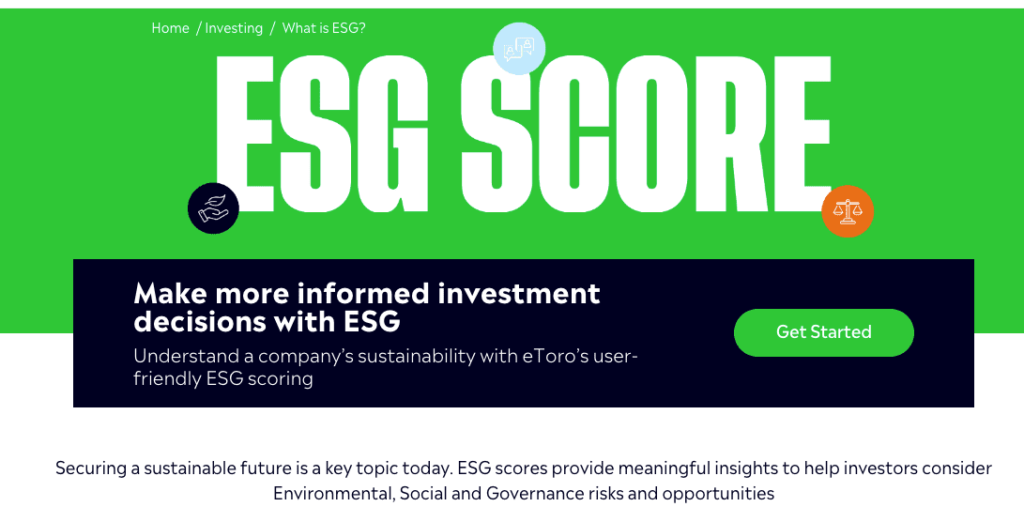eToro is an innovative social trading and multi-asset investment company offering a range of services, such as financial, ESG, sustainability, and copy trading. ESG investing is a sustainable investment practice that focuses on environmental, social, and governance (ESG) criteria to make more informed investment decisions. eToro has been leading the way in ESG investing, offering a range of ESG-focused services.
- What is the eToro copy trading platform?
- eToro advantages
- Etoro advantages for beginner investors
- How much does it cost to get started on eToro?
- FAQ on socially responsible investing

What is the eToro copy trading platform?
eToro’s core offering is its Social Trading or Copy Trading platform, which allows users to copy the trades of other successful traders. It is a system whereby you can follow and replicate the trades of some of the most successful traders. This allows users to learn quickly and automate some of the investment process. This makes it easier for new traders to get started, as they can quickly gain experience by learning from more experienced traders. The platform also offers a range of ESG trading options, enabling users to invest in companies that conform to ESG criteria, much faster than they could through other platforms.
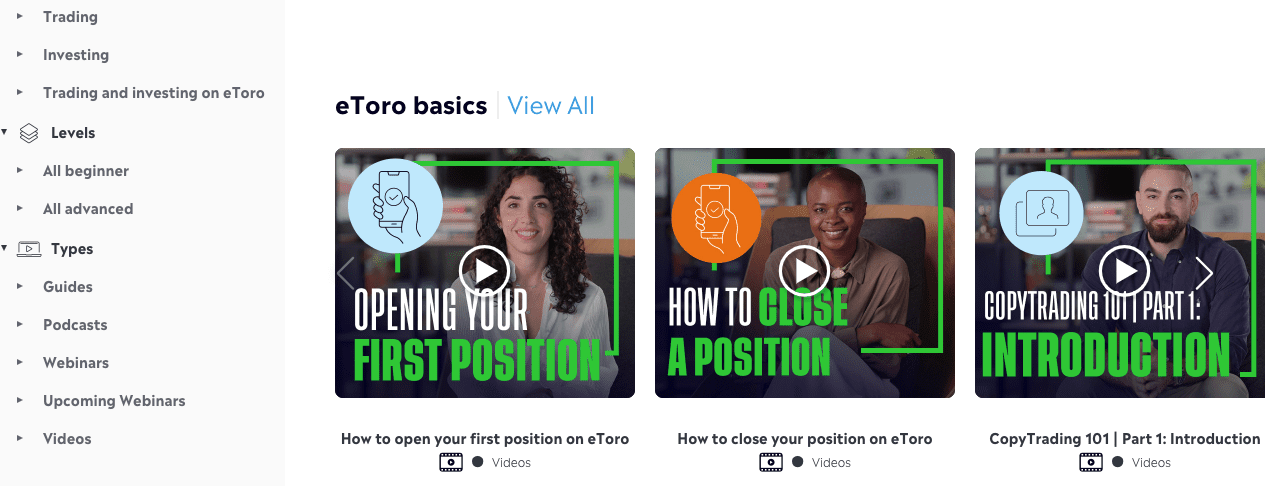
Does Etoro give investment advice?
eToro has also developed the eToro Academy, an online educational resource that provides comprehensive tutorials and articles on trading. The eToro Academy is designed to help traders of all levels become better investors, by teaching them the basics of investing, as well as more advanced topics such as market analysis and risk management.
eToro advantages
What makes the eToro trading platform unique from other online investing companies is its focus on creating a community of investors. The platform allows users to interact with each other, discuss trading strategies, and share ideas. This has helped to create a vibrant and supportive trading environment, which is beneficial for both experienced and novice traders.
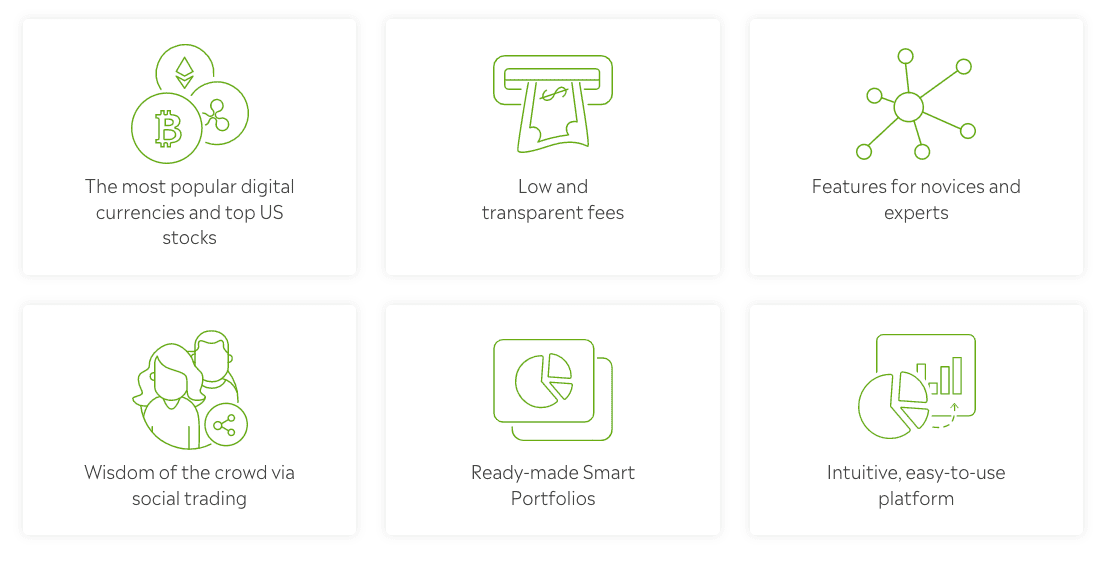
eToro benefits
One of the key benefits of investing with eToro is its low fees, which makes it an attractive option for budget-conscious investors. The platform also offers a range of features, including copy trading, market analysis tools, and social trading.
eToro pros
The pros of investing with eToro include its low fees, comprehensive educational resources, and its vibrant community of traders. On the downside, the platform is not suitable for advanced traders, as it does not offer a wide range of advanced trading features.

Etoro advantages for beginner investors
- Variety of investment options: eToro offers a wide range of investment options, including stocks, ETFs, commodities, indices, and cryptocurrencies.
- Crypto assets are available.
- User-friendly interface: eToro’s user-friendly trading platform is designed to be easy to use and navigate, making it a great choice for beginner investors.
- Copy trading feature: eToro’s copy trading feature allows users to copy the trades of experienced traders, making it easier for beginners to get started.
- Risk management tools: eToro’s risk management tools, such as stop-loss orders, leverage and margin, help users manage their investments and minimize losses.
- Artificial Intelligence: eToro has integrated AI to help you accelerate your investing.
eToro USA LLC does not offer CFDs, only real Crypto assets are available. Stop Loss and Take Profit are not guaranteed and trading with leverage involves high risk.
eToro Features
Notable features of eToro include:
- Low fees
- Comprehensive educational resources
- Copy trading
- Market analysis tools
- Social trading
- The addition of Artificial intelligence on their platform
eToro offers a range of pricing options, including a free plan for those who want to get started with the platform, as well as premium plans for more advanced traders.
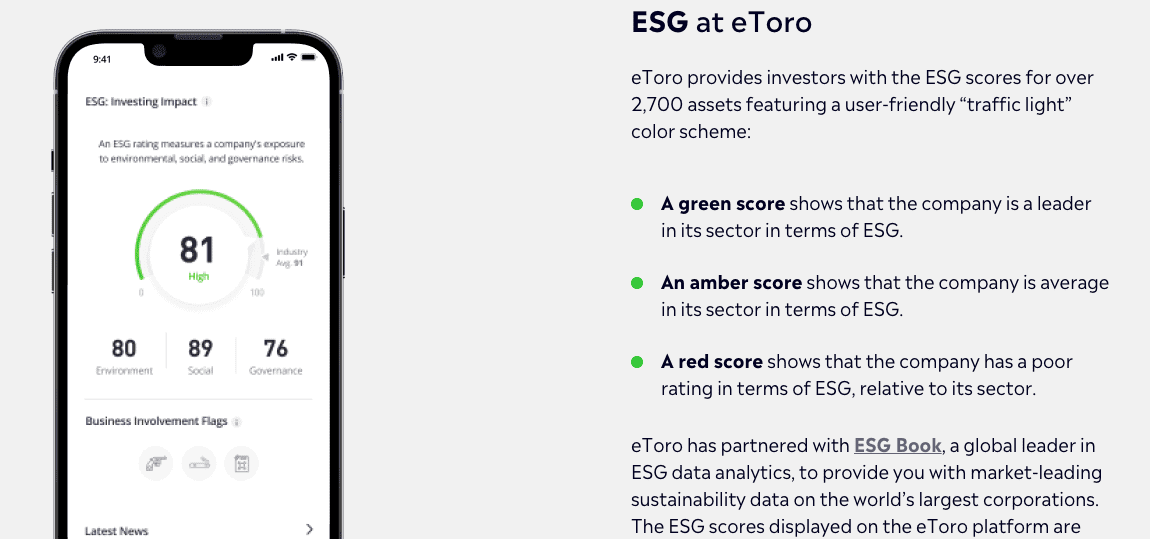
What about eToro reviews?
Many users have praised eToro for its user-friendly platform, low fees, and vibrant trading environment. One user said, “I’ve been using eToro for a year now and I’m very happy with the service. It’s easy to use, the fees are low, and the customer service is great.” eToro receives generally positive reviews from customers with 83% of customers rating it as excellent. Customers praise the platform for its ease of use, helpful customer service, and wide range of trading options. Additionally, many customers find the CopyTrader feature to be particularly useful.
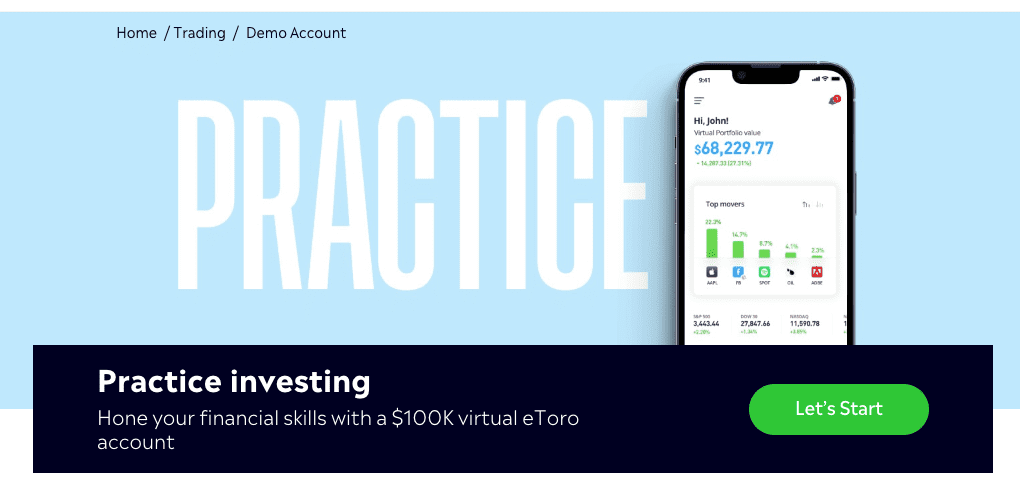
How much does it cost to get started on eToro?
There are several different ways to start trading on Etoro. The basic account is free, but you can upgrade to a Premium or VIP account for a small monthly fee. The cost of buying and selling assets on Etoro varies depending on the asset and the market conditions. Generally, when buying stocks, ETFs, and cryptocurrencies you will pay a spread, which is the difference between the buy and sell prices. You may also incur trading fees depending on your account type. These can range from 0% to 2%. Withdrawal fees may also apply, which are standard on all trading platforms.
In addition to trading costs, you may incur overnight fees when holding open trades or positions overnight. These are generally charged at a rate of 0.04% – 0.07% per annum and can vary depending on the asset involved. All other fees such as deposit and withdrawal fees are clearly shown in Etoro’s fee table before you make any transactions. All fees are subject to change so it’s important to check the most up-to-date information before making any trades. Overall, Etoro is a great platform for beginner and experienced traders alike, with competitive and transparent fees that make trading easy and cost-effective.
What are eToro smart portfolios?
A smart portfolio is a professionally managed portfolio that uses algorithmic-driven strategies to manage your investments. These portfolios are tailored to meet your individual risk tolerance, investment goals, and needs. They can help you diversify across different asset classes including stocks, bonds, commodities, and cryptocurrencies. With Etoro’s advanced trading algorithms and its social network of millions of traders, you can access investment strategies that are designed to maximize your potential return. You’ll also get help from Etoro’s research team and market analysis so you can stay informed on current market trends.
What are the types of trades that eToro offers access to?
eToro offers users to access a wide range of markets, including forex, stocks, commodities, indices, Crypto trading, and ETF trading. With over 2000 assets to trade in you have the ability to diversify your portfolio or focus on a specific sector. Etoro also provides an innovative copy trading feature that allows traders to automatically copy the trades of experienced investors.
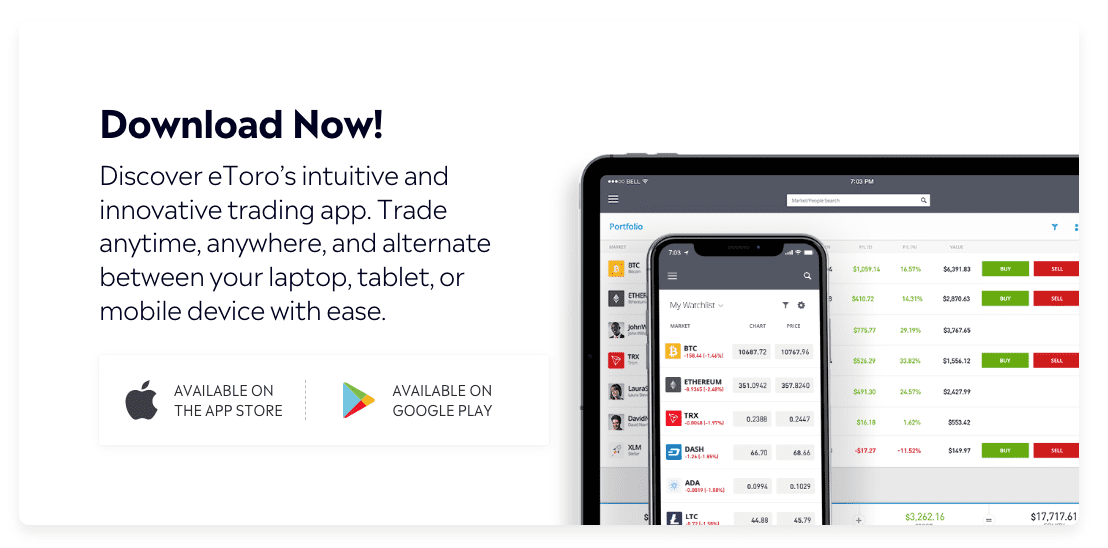
In conclusion
The eToro club is an innovative social trading and multi-asset investment company that provides a range of services, such as financial, ESG, sustainability, and copy trading. The platform offers a range of features, including copy trading, market analysis tools, and social trading. It also has a vibrant community of traders and comprehensive educational resources. With its low fees and range of pricing options, eToro’s platform is an attractive option for budget-conscious investors looking for a user-friendly platform and a supportive trading environment.
eToro Disclaimer: eToro is a multi-asset platform that offers both investing in stocks and crypto assets, as well as trading CFDs. Please note that CFDs are complex instruments and come with a high risk of losing money rapidly due to leverage. 77% of retail investor accounts lose money when trading CFDs with this provider. You should consider whether you understand how CFDs work and whether you can afford to take the high risk of losing your money. Past performance is not an indication of future results. The trading history presented is less than 5 complete years and may not suffice as a basis for investment decisions. Copy Trading does not amount to investment advice. The value of your investments may go up or down. Your capital is at risk. Cryptoasset investing is highly volatile and unregulated in some EU countries. No consumer protection. Tax on profits may apply. eToro USA LLC does not offer CFDs makes no representation and assumes no liability as to the accuracy or completeness of the content of this publication, which has been prepared by our partner utilizing publicly available non-entity-specific information about eToro.

FAQ on socially responsible investing
8 sustainable investing strategies
- Shareholder Action is a form of sustainable investing that involves shareholders pushing for corporate changes in order to bring about positive environmental and social impacts. Investors can work with other shareholders to submit proposals or resolutions to company boards, as well as vote in favor or against resolutions presented by management. These actions can help promote sustainability in the company such as reducing waste, better energy efficiency standards, and improved labor practices. Shareholder action is an important way to use financial power to influence companies and further sustainability goals.
- Activist Investing is a strategy where investors actively push for changes in companies they invest in in order to drive long-term value. Activist investors target underperforming companies or poorly managed companies and attempt to make strategic improvements through tactics like restructuring, divestment, shareholder engagement, corporate governance reform, and more. Activist investors are often vocal about their thoughts on what a company should do differently, giving them the potential to be a powerful force for good that drives sustainability initiatives forward.
- Sustainability-themed investing is an approach that focuses on selecting investments based on criteria related to environmental, social, and corporate governance (ESG) factors. This type of investing looks for businesses whose values align with investor goals of making an impact by supporting sustainable initiatives like renewable energy projects, modernizing water infrastructure, and minimizing the negative impacts of climate change. Ultimately this approach seeks out those companies who are most likely to create long-term value through positive ESG outcomes while still delivering competitive returns.
- Impact Investing takes it one step further by focusing not only on ESG factors but also seeking out investments that benefit specific communities or solve certain social issues. Impact investments are also known as “double bottom line” investments because they seek both financial returns as well as environmental or social benefits. The goal of these types of investments is often very narrowly focused such as providing affordable housing or creating new job opportunities for underserved populations within a particular locality or region. Impact investing helps direct capital towards projects that have the potential to make meaningful changes while also yielding returns for investors over time.
- Negative Screening trading strategies are where investors eliminate investments that have negative environmental, social, or governance (ESG) impacts. This strategy helps investors avoid investing in companies with less desirable practices, such as those involved in animal testing or those who participate in political activities. The primary benefit of this strategy is that it allows investors to align their values with their investments and take a stance against certain corporate behaviors.
- Positive Screening is the opposite of negative screening and involves investing in companies or organizations that are making positive ESG contributions. By investing in these companies, investors are able to promote sustainable initiatives and lend their financial support. This strategy offers long-term benefits as many of these companies often have favorable returns when compared to similar investments without having any ESG considerations.
- Portfolio Tilt is a strategy where investors actively adjust their portfolio mix based on the ESG ratings of each investment they hold. Investors can tilt their investments towards higher-rated ESG stocks while reducing exposure to lower-rated ones. This allows investors to focus more capital on the companies thatare taking steps towards sustainability while avoiding those whose operations may be detrimental to the environment or society at large. The benefit of this approach is that it can help return better results over time by eliminating riskier investments from portfolios and shifting allocations towards more responsible ones.
- ESG Integration is the practice of proactively incorporating ESG criteria into an investor’s overall investment process when selecting potential investments for their portfolio. This involves systematically assessing each company’s impact on key ESG issues such as climate change, human rights, labor issues, and other sustainability concerns before making any decision about adding them as part of an investor’s portfolio choice set. The benefit of this approach lies in its ability to create a more diverse portfolio that considers both financial performance and positive social impact when deciding which stocks to include or exclude from an investor’s holdings.
What is ESG investing?
ESG investing is a set of standards for a company’s behavior used by socially conscious investors to screen potential investments. It considers how a company safeguards the environment, manages relationships with employees, suppliers, customers, and the communities where it operates, and deals with a company’s leadership, executive pay, audits, internal controls, and shareholder rights. ESG investing is sometimes referred to as sustainable investing, responsible investing, impact investing, or socially responsible investing (SRI).
What are the types of sustainable investment?
1. Impact investing – investing in companies, organizations, and funds that are seeking social and environmental impact alongside financial returns;
2. Clean energy investing – investing in companies developing and deploying clean energy technologies;
3. Fossil fuel-free investing – investing in companies and funds that do not invest in fossil fuels;
4. Socially responsible investing (SRI) – investing in companies that meet certain social and/or environmental criteria;
5. ESG investing – investing in companies that adhere to certain environmental, social, and governance standards;
6. Shareholder advocacy – engaging with companies to encourage them to become more sustainable;
7. Divestment – exiting investments in companies or sectors that are deemed unsustainable;
8. Sustainable ETFs – investing in exchange-traded funds (ETFs) that focus on sustainable investments;
9. Sustainable mutual funds – investing in mutual funds that focus on sustainable investments; and
10. Green bonds – investing in companies and organizations that issue bonds to finance environmental projects.
What are the benefits of sustainable investing?
Yes, some of the benefits of sustainable investing include:
1. Financial returns – many sustainable investments are proven to generate comparable or better returns than traditional investments;
2. Intrinsic returns – deeper connections between investors and their investments, creating longer-term customer loyalty;
3. Environmental benefits – investing in sustainable investments can help reduce carbon emissions and improve air, water and soil quality;
4. Social benefits – investing in sustainable investments can help improve access to healthcare, education, and other basic services;
5. Risk management – investing in sustainable investments can help reduce the risk of investing in companies with negative environmental or social impacts; and
6. Impact – Investing in sustainable investments can help create positive, measurable environmental and social impacts.
What does sustainable ESG investing have to do with renewable energy?
The effect of sustainable investment on renewable resources is deeply intertwined. Sustainable investing, which focuses on investing in companies and projects that promote environmental and social responsibility, can have a direct impact on the development of renewable energy sources. By creating a demand for such investments, sustainable investors are essentially creating an incentive for businesses to switch from unsustainable practices to renewable resource-based models. This in turn encourages investment in renewable energy sources, leading to increased production and usage of these resources. This can create a much-needed boost for the renewable energy industry, allowing it to further expand and provide more options for consumers. In addition, by making investments that promote sustainability, investors are helping to reduce carbon emissions and other forms of pollution that have damaging effects on the environment.
What is ESG investing?
ESG investing the practice of integrating environmental, social, and governance criteria into the investment process. This approach seeks to capture long-term returns by investing in companies that are managing risks responsibly and creating value over time through sound management of environmental, social, and governance factors. When selecting investments for an ESG portfolio, investors take into account a company’s performance on a range of ESG criteria, including but not limited to carbon emissions, climate change preparedness, human capital management, and development, diversity in the workplace, responsible taxation practices, and corporate ethics. Investing in companies that have strong ESG scores can lead to positive returns as well as reduced risk associated with environmental and social challenges.
What are online brokerage firms and what do they do?
If you want to invest in the stock market but don’t want to spend a lot of time managing your investments, an online brokerage firm may be a good option for you. Online brokerage firms are companies that offer online trading services and platforms for investors. They provide tools, such as research reports and technical analysis, to help investors make informed decisions about their investments. In addition, online brokers provide access to a variety of instruments that are available through most financial institutions, including stocks, bonds, mutual funds, and ETFs. They also offer educational resources and customer service support to help investors understand the stock market and make informed decisions, including the difference between the market cap and the market price.
Online brokers typically offer lower commission fees than traditional brokerage firms. This is because they have fewer overhead costs and can pass the savings on to their customers. In addition, many online brokers offer attractive bonuses and promotions to entice new customers, like free training.
Astute business leaders have also read…
What are Sustainable Investing Companies?
ESG meaning: A Comprehensive Guide to ESG Investing
Shareholder Resolutions: Your Guide to Proxy Voting Mutual Funds
Copy Trading: How to Profit from the Wisdom of the Crowd

Dean Emerick is a curator on sustainability issues with ESG The Report, an online resource for SMEs and Investment professionals focusing on ESG principles. Their primary goal is to help middle-market companies automate Impact Reporting with ESG Software. Leveraging the power of AI, machine learning, and AWS to transition to a sustainable business model. Serving clients in the United States, Canada, UK, Europe, and the global community. If you want to get started, don’t forget to Get the Checklist! ✅
